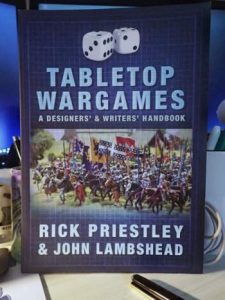Tabletop Wargames: A Designer’s & Writer’s Handbook
by Rick Priestley and John Lambshead
On Amazon: Tabletop Wargames: A Designer’s and Writer’s Handbook
Publisher’s Website: Pen and Sword
Every wargamer I know has at one time written a set of rules, to varying degrees of success. Some produced polished, well-thought out systems worthy of publication (and some I have tested did indeed make it to print). Far too many, however, have been awkward efforts lacking in one or more key elements, such as balance between simulation and game, logic, cohesion, workable probabilities, playable scaling,
For those with the latter sort of rules, Rick Priestly and John Lambshead have written Tabletop Wargames: A Designer’s & Writer’s Handbook. Priestly is the legendary Games Workshop designer. Lambshead is a computer game designer, editor and author for Games Workshop and Osprey and novelist.
Tabletop Wargames lays out issues that designers must resolve, and offer examples of different mechanisms. The book begins with a discussion on the line between a simulation and a game, then covers gaming scales, probabilities, turn sequences, combat resolution, presentation, how skirmish games differ from larger scale games, point values, campaigns and scenarios. There is even a section with advice on how to keep the gaming language neat and tidy so that the rules lawyers do not have a field day.
The tone of Tabletop Wargames is conversational, and the book is laden with exemplars from rules sets that most gamers will recognize. It is a quick read, but has enough material to make it worth going back to for reconsideration when making critical decisions about your rules set.
One thing that I wish the authors had included is a checklist, or outline of things for rules authors to consider when moving through the design process. The elements for such a list are all there in the book, but because it is conversational, explicit points are often difficult to discern.




1 thought on “Book Review — Tabletop Wargames: A Designer’s & Writer’s Handbook”